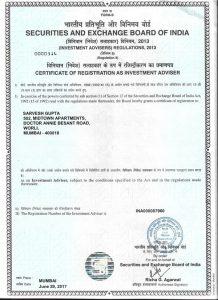I have been a keen follower and student of the equity asset management industry and the way it has evolved and how investors have behaved and should behave in the future. I am laying down some points that I have learned and what I consider are universal truth for everyone and I hope all of you will benefit from this which I have learned on account of my own experience in the industry and comprehensive study.
- Equity asset managers who charge just the fixed fee or a fullsome fixed fee including all mutual funds and almost all PMS firms, hedge funds are playing a game called ‘Heads I win a lot, you win but less but Tails I still win a lot and you loose a lot’. This, in most cases, creates a lack of owner’s mentality which is the most important reason behind lack of alpha generation in the long term. One should read about what Warren Buffett has to say about so called Hedge fund-managers or Private equity guys who are all smart but most of them struggle to beat the benchmark. Everything else equal, one should always prefer managers relying on profit share over fixed % of AUM as fee. Bottomline is – know how the incentives are aligned. Some PMS or MF guy who is charging mostly fixed fee is going to care very less about your long term returns but will care the most about his short term income and fees.
- Most PMS managers have shown great perfromance in the past few years but that is not because of any great skill but luck. BSE Small cap index with almost 700 stocks is up 3 times in the past 4 years. So a PMS or a small cap fund like DSP ML saying that they have done 25-45% in the past 3 years means nothing – we will alll know who was swimming naked when there is sustained crash in the market and there is a high chance that a large % of performance will be wiped out in many cases. Basically you will come to know whether your portfolio manager was running a high beta or a alpha portfolio only in bad times and we haven’t seen it yet.
- Most of the PMS strategies are not scalable in India due to lack of liquidity and lack of enough small and mid cap great ideas particularly in these times when valuations have gone up so much. It is a pity that most gullible investors are going to put money now in equity markets when they are already at a all time high and no valuation arbitrage is left on almost most stocks, but particularly in small and mid cap space. So the known PMS funds and small cap mututal funds would struggle to replicate their performance if they have already done so well.
- Most importantly, I saw that most of the people are talking about returns here which is not the only important metric in investment management. You should invest with a manager whose style you are comfortable with. And whose funds objectives resonate with yours. Corollary to this is any asset management company which says that we have multiple strategies each suiting for a different investor is making a fool of investor. No matter how big a team is, equity investing comes down to just one portfolio manager view and he has limited time and bandwidth to know so well so many stocks. And such great managers dont come dime a dozen and certainly they would not stick for long with a broker or a NBFC – most if not all great managers will set up their own firms.
- No matter how great a manager is, the size of the investment fund and its performance are inversely correlated. So all the known names that you are talking about are going to struggle a lot in replicating their performance going forward. Some funds I know have produced great returns buying Bajaj Finance at 1-2 times book – how will they perform the same since they are buying the same stock for you at 7-10 times book now.
- Standalone focused portfolio managers or SEBI registered investment advisors are far more preferable over corporate houses or those whose main business is not equity asset management. This is especially true for those where this is a marginal business. Globally, the best of the investors do only thing – invest. Be it private equity (Blackstone, Warburg Pincus) or public equities (Berkshire Hathway, Baupost) – all the best investors generally do not belong to the corporate houses. The reason is very simple – the best of the fund managers know that they are the best and even a Prashant Jain (HDFC CIO, India’s best-known MF Manager) salary is no match to what a much smaller guy like Ashish Kacholia (Lucky securities, net worth of over 750 cr) can make. So the best of fund managers always start on their own leaving behind the corporate house. However, you have to be able to have trust on the standalone managers you invest with. Secondly, for the corporate, this is just one of the many businesses, they never have the focus on this. And focus is everything in business. Please read a gem on marketing called Focus by Al Ries to know more of what I am trying to say here. Thirdly, equity asset management if done rightly produces very lumpy results – something which most publicly listed and large groups hate. A Motilal would never like to charge a ‘profit share only’ because then the earnings line would be very volatile. But then, that’s precisely the problem – creation of wrong incentives in the system to accumulate assets rather than show performance. Don’t we all hate businesses which are just focused on revenues and scale rather than RoE and RoIC?
- With regards to fee, I would advise not to be overly focused on fees (please read the example in this point which I am giving). The Bottomline is – unless the fees is totally out of whack it does make a lot of sense to go for the best manager (trust, integrity, pedigree, right incentives) rather than haggle about few % points of fees here and there. Managers who have high degree of integrity, a long-term outlook (they are not there to make a quick buck but to create a lasting organization for 20-50 years plus) and work always towards enhancing their skill sets will always create greater long-term returns (even though somebody else’s performance might look sexier in the recent past) because they will never expose you to risk so much that the portfolio value or investor’s interest itself goes away. This analogy is similar to buying a TBZ stock or a Titan stock. While TBZ may trade at 15 times and Titan at 30 times, if you are looking to compound your wealth over 20-25 years, I would pick Titan over TBZ anyday (although as a value investor with an option to buy nothing, I would buy none of the stock currently). So don’t overly worry about fees, the game of money management is such that best of money managers are destined to be filthy rich, as layman investors who have other work to do and we are not full time investors, we need to focus on whether the a) manager is highly skilled, b) manager is generally risk averse and conservative, c) manager is man of words, integrity and d) most importanltly, whether he is making money when I make money – meaning whether rewards of investor and manager are properly aligned. In this regards, the world’s best performing hedge fund (medallion, has probably made returns double/triple of warren buffett in the last two decades) charges 5% fixed fee and 44% profit share (https://www.bloomberg.com/news/articles/2016-11-21/how-renaissance-s-medallion-fund-became-finance-s-blackest-box). While I am not recommending paying this much :slight_smile, do focus on manager’s skills & incentives much much more than fees for your long term benefit.
So what should one do – look for a porfolio manager who is charging most of his fees through performance fee only (Buffett has never charged fixed fee to his investors), one whose own most of the networth is invested alongside you, one who is belongs to value investing style, one who is not already so rich (because if he has already made good money then his incentives may not be aligned with you) and one who has the right pedigree/education/experience in the markets to actually take the right calls (for instance someone coming from a sales or sell side equity research background is already spoiled to make a good manager – someone who has always been on the buy side is much better).
Please understand that all of the above are my own biased views.

